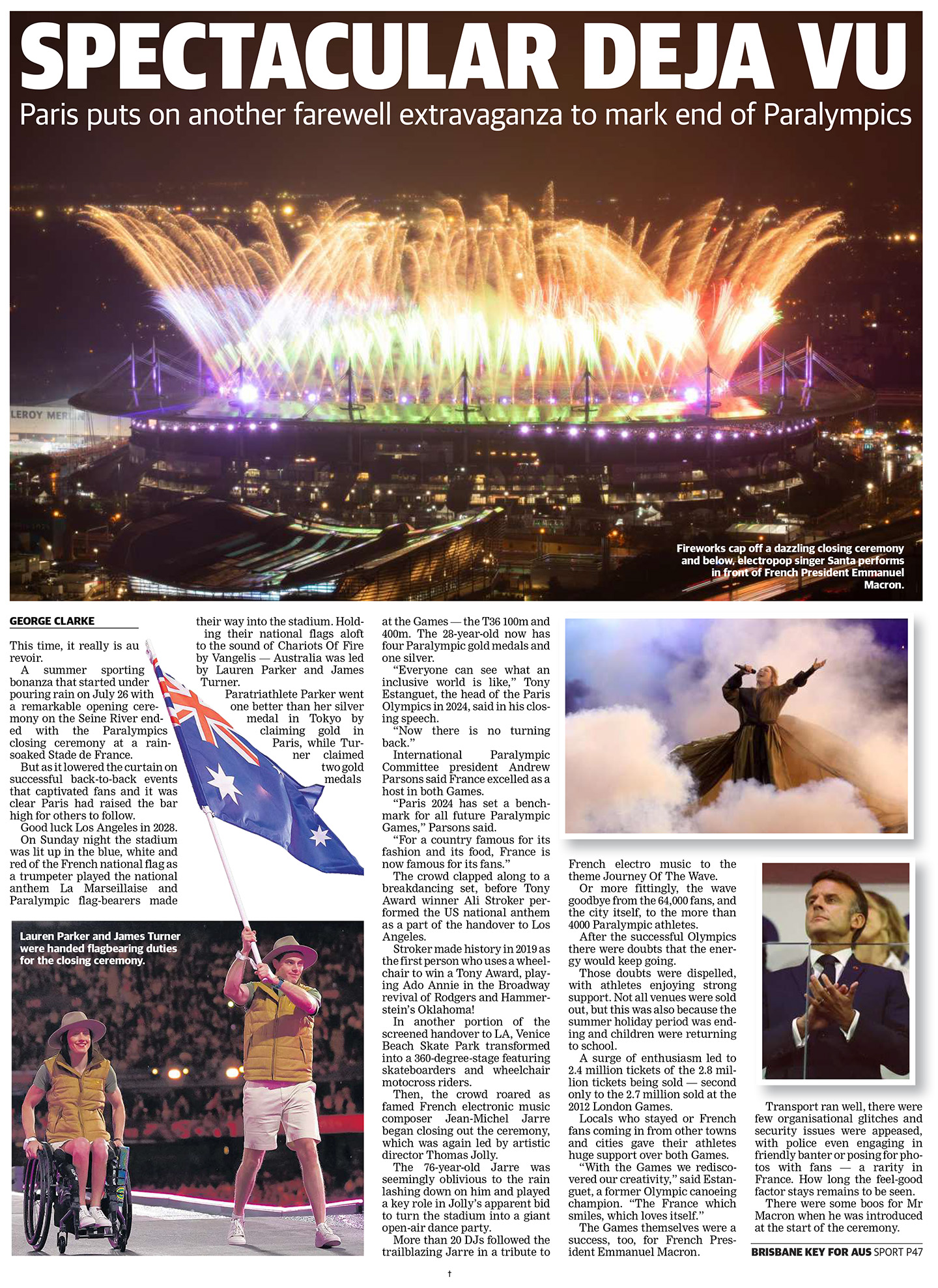
Article by George Clarke, courtesy of The West Australian.
This time, it really is au revoir.
A summer sporting bonanza that started under pouring rain on July 26 with a remarkable opening ceremony on the Seine River ended with the Paralympics closing ceremony at a rain soaked Stade de France.
But as it lowered the curtain on successful back-to-back events that captivated fans and it was clear Paris had raised the bar high for others to follow.
Good luck Los Angeles in 2028.
On Sunday night the stadium was lit up in the blue, white and red of the French national flag as a trumpeter played the national anthem La Marseillaise and Paralympic flag-bearers made their way into the stadium. Holding their national flags aloft to the sound of Chariots Of Fire by Vangelis — Australia was led by Lauren Parker and James Turner.
Para triathlete Parker went one better than her silver medal in Tokyo by claiming gold in Paris, while Turner claimed two gold medals at the Games — the T36 100m and 400m. The 28-year-old now has four Paralympic gold medals and one silver.
“Everyone can see what an inclusive world is like,” Tony Estanguet, the head of the Paris Olympics in 2024, said in his closing speech.
“Now there is no turning back.”
International Paralympic Committee president Andrew Parsons said France excelled as a host in both Games.
“Paris 2024 has set a benchmark for all future Paralympic Games,” Parsons said.
“For a country famous for its fashion and its food, France is now famous for its fans.”
The crowd clapped along to a breakdancing set, before Tony Award winner Ali Stroker performed the US national anthem as a part of the handover to Los Angeles.
Stroker made history in 2019 as the first person who uses a wheelchair to win a Tony Award, playing Ado Annie in the Broadway revival of Rodgers and Hammerstein’s Oklahoma!
In another portion of the screened handover to LA, Venice Beach Skate Park transformed into a 360-degree-stage featuring skateboarders and wheelchair motocross riders.
Then, the crowd roared as famed French electronic music composer Jean-Michel Jarre began closing out the ceremony, which was again led by artistic director Thomas Jolly.
The 76-year-old Jarre was seemingly oblivious to the rain lashing down on him and played a key role in Jolly’s apparent bid to turn the stadium into a giant open-air dance party.
More than 20 DJs followed the trailblazing Jarre in a tribute to French electro music to the theme Journey Of The Wave.
Or more fittingly, the wave goodbye from the 64,000 fans, and the city itself, to the more than 4000 Paralympic athletes.
After the successful Olympics there were doubts that the energy would keep going.
Those doubts were dispelled, with athletes enjoying strong support. Not all venues were sold out, but this was also because the summer holiday period was ending and children were returning to school.
A surge of enthusiasm led to 2.4 million tickets of the 2.8 million tickets being sold — second only to the 2.7 million sold at the 2012 London Games.
Locals who stayed or French fans coming in from other towns and cities gave their athletes huge support over both Games.
“With the Games we rediscovered our creativity,” said Estanguet, a former Olympic canoeing champion. “The France which smiles, which loves itself.”
The Games themselves were a success, too, for French President Emmanuel Macron.
Transport ran well, there were few organisational glitches and security issues were appeased, with police even engaging in friendly banter or posing for photos with fans — a rarity in France. How long the feel-good factor stays remains to be seen.
There were some boos for Mr Macron when he was introduced at the start of the ceremony.
















